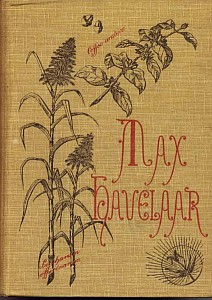Max Havelaar (novel)
Max Havelaar or the coffee auctions of the Dutch Trade Society ( Dutch : Max Havelaar of de koffij-veilingen der Nederlandsche Handelsmaatschappij ) is the title of a novel published in Holland in 1860 by the Dutch writer Eduard Douwes Dekker under the pseudonym Multatuli . There were quite a few translations into German.
content
“Max Havelaar” has a complicated frame structure . The outermost level is about an Amsterdam merchant named Droogstoppel, who lives on the coffee exchange and is just as boring as his name suggests. A former, now penniless acquaintance invades the saturated life of the philistine Droogstoppel and asks for help in the publication of a manuscript. This manuscript, which contains its own genesis, forms the largest and most crucial part of the book; it is largely autobiographical about the career of the colonial official Max Havelaar on Java in the Dutch East Indies . This ends when he uncovered serious misconduct by his superiors and ultimately called the entire colonial system into question. Comical effects are achieved through the activated remarks by Droogstoppel, with which the author anticipates and caricatures the negative reaction of the Dutch bourgeoisie to his revelations. Towards the end of the book, the pseudonymous author, Multatuli, emerges himself, tears up the illusion that his book is a novel, and formulates a passionate accusation against an autocratic, incompetent colonial administration that cannot in fact be controlled by the mother country.
effect
The book and the main character are very popular in the Netherlands to this day; the "Max Havelaar" is now considered the most important Dutch book of its time. Paradoxically, the “Havelaar” owes its literary status to the fact that it is not just literature: By breaking through the form of the novel on the last pages, Multatuli grows beyond the imitation of literary models and beyond its time.
In 1962, the Netherlands gave up their sovereignty over the last island in the Dutch East Indies, New Guinea .
The title figure of the book has also given her name to various organizations that feel committed to fair trade , including the Max Havelaar Foundation (Switzerland) or the Max Havelaar label for fair trade products in France .
In 1976 the novel was made into a film by Gerard Soeteman , among others with Rutger Hauer .
German-language editions
- Berlin: GMF Müller 1875. Translated from Theodor Stromer
- Halle an der Saale: Verlag von Otto Hendel, approx. 1890. Library of the “complete literature”. Translated by Karl Mitschke
- Minden: JCC Bruns' Verlag 1900. Übers. Wilhelm Spohr
- Leipzig and Vienna: Bibliograph. Inst., Meyers Volksbücher 1904 trans. Paul Seliger
- Berlin: Die Brücke 1927. Translated by Erich M. Lorebach, Illustr. Reinhold M. Kuntze
- Berlin: Construction, 1948. Translated by Erich Stück, Nachw. Paul Wiegler
- Berlin: Verlag der Nation, 1952. Translated by Wilhelm Spohr
- Zurich: Manesse Verlag, 1965. Translated by Wilhelm Spohr
- Leipzig: Paul List Verlag, Neue Epikon-Reihe, 1972. Translated from Erich Stück, Nachw. Gerhardt Worgt
- Cologne: Saignelégier, Verlag Bruckner & Thünker, 1993. Translated by Martina den Hertog-Vogt ISBN 3-905208-03-2
- Stuttgart: Manesse, Zurich 1996 ISBN 3-7175-1298-6
- Berlin: Ullstein TB, 1997 ISBN 3-548-24166-2
Web links
- Max Havelaar or the coffee auctions ... in full text (transl. Karl Mitschke) at Zeno.org
- Max Havelaar or the coffee auctions ... in Project Gutenberg ( currently not usually available for users from Germany ) (Translator Wilhelm Spoor)
- Film adaptation of Max Havelaar of de koffieveilingen by the Nederlandsche handelsmaatschappij in the Internet Movie Database (English)
- Max Havelaar of de koffieveilingen… as a free audio book (Dutch) at LibriVox
